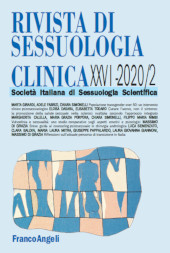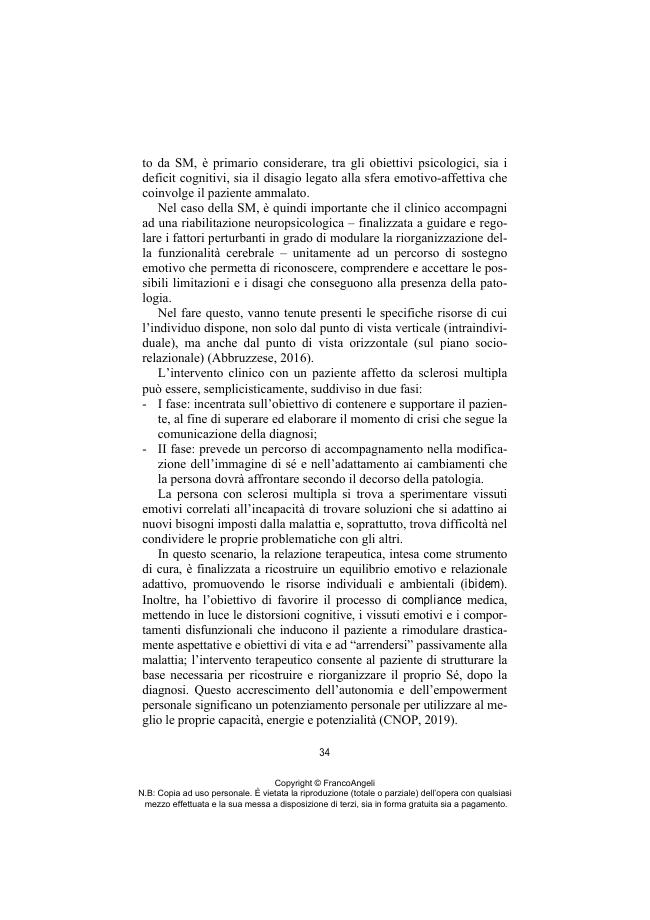2020 - Franco Angeli
Artikel
Digital Version
Herunterladen | Kopieren/Einfügen | Drucken
Curare l'uomo, non il sintomo : la promozione della salute sessuale nella sclerosi multipla secondo l'approccio integrato
23-45 p.
- La sclerosi multipla è una patologia autoimmune cronica e degenerativa, ad eziologia sconosciuta, che colpisce il sistema nervoso centrale. Da un'indagine AISM-CENSIS del 2017 emerge come circa il 50% delle persone affette da tale patologia lamentino sofferenza significativa nell'area di funzionamento psicologico; tale dato viene ipotizzato strettamente correlato al tema della graduale diminuzione dell'autosufficienza percepita. Tale dimensione diviene ancora più presente qualora il soggetto si trovi in una relazione di coppia, la quale passa dall'essere simmetrica e paritaria all'essere caratterizzata da una iniqua distribuzione del senso di autonomia e autosufficienza. Stando a quanto diffusamente affermato dalla Dichiarazione dei Diritti Sessuali, dai documenti tecnici e dalla letteratura scientifica internazionale, la salute sessuale è fondamentale nella definizione del benessere individuale e relazionale.
- Di conseguenza, anche quando un soggetto si trovi in una condizione di patologia cronica ingravescente, è necessario non solo indagare l'eventuale presenza di disagi nella sfera sessuale, ma anche utilizzare strumenti di intervento integrato per poterli affrontare adeguatamente. Dall'analisi della letteratura considerata emerge come, nonostante la mole di studi prodotti in direzione di una gestione integrata tra diverse competenze cliniche, emergano numerose difficoltà nell'armonizzare i diversi interventi in un modello di cura integrato. Si ipotizza che tale scenario sia conseguenza della profonda scissione esistente, ancora oggi, nella presa in carico dei pazienti con patologia cronica, considerati "corpo" o "psiche", con una conseguente impossibilità di prendersi cura dell'uomo nella sua complessità. [Testo dell'editore].
- Multiple sclerosis is a chronic and degenerative autoimmune disease of unknown etiology that affects the central nervous system. It is generally diagnosed between 20-40 years old and currently affects about 118,000 people in Italy, with an estimated 3,400 new cases a year; it has a double prevalence in women than in men. From a 2017 AISM-CENSIS survey, emerges that about 50% of people affected by this pathology complain psychological difficulties; this data can be explained with the gradual decrease in self-autonomy, with consequences in the quality of life and in relational functioning. This dimension becomes even more present in a couple relationship, which starts equal to become unequal and asymmetric. This aspect, concerning different areas of the couple's dynamics, inevitably affects sexuality too. According to what is widely stated in the Declaration of Sexual Rights and in international scientific literature, sexual health is fundamental for the quality of personal and couple life.
- Consequently, it is necessary not only to investigate the possible presence of discomfort in the sexual response, but also to use integrated tools to be able to deal with it. The prevalence of sexual dysfunctions in patients with multiple sclerosis suggests the need to take care of the patient, including the investigation of sexuality. The presence of sexual dysfunctions was highlighted in men in the range of 50-73% of cases, and in women up to 82.5% of cases. These data are significantly higher than those of the general population. In the introduction of the present work, is presented the clinical definition of multiple sclerosis, underlining how it manifests and investigating its epidemiological aspect. Afterwards, different studies are discussed relating to the presence of sexual dysfunctions in multiple sclerosis and highlighting the consideration of multiple etiology.
- In fact, sexual dysfunctions in multiple sclerosis can be linked to different causes, such as the presence of lesions in the higher centers, which interrupt the variation and integration of stimuli able to activate and support the sexual response; injuries to the spinal cord and peripheral nerves and injuries to the hypogastric nerves. Another important role in the development of sexual dysfunction in people with multiple sclerosis is related to alterations in hormone secretions. Multiple sclerosis lesions can affect the hypothalamus and the fibers that originate from it, thus interfering with the hypothalamus-pituitary-gonadal axis. In addition, the reduction in circulating testosterone levels is demonstrated in subjects with multiple sclerosis, both male and female. On the contrary, regular sexual activity increasing the circulating levels of testosterone and estriol, has neuroprotective and anti-inflammatory effects, promoting muscle relaxation, facilitating sleep and decreasing depressed mood.
- For this reason, it is essential to deal with the evaluation and treatment of sexual dysfunctions, in order to restore a virtuous health circuit, following the bio-psycho-social model. Regarding treatment, sexual counseling is generally aimed at the evaluation of symptoms. From the literature considered, it emerges that, despite the amount of studies suggesting an integrated management between different medical skills, various difficulties emerge in harmonizing the various interventions in an integrated model of care. It is hypothesized that this scenario is a consequence of the split, still existing today in the treatment of chronic diseases, in the considering "body" or "psyche" with the lack of taking care of patients in their complexity. A chance towards integration comes from the integrated approach in Clinical Sexology. In conclusion, to provide a useful guideline for investigating of the patient's sexuality, an example of an integrated approach is presented through the PLISSIT model. [Publisher's text]
- .
Ist Teil von
Rivista di sessuologia clinica : 2, 2020-
Informationen
ISSN: 1972-5183
KEYWORDS
- Patologie croniche, sclerosi multipla, salute sessuale, diritti sessuali, approccio integrato, modello bio-psico-sociale
- Chronic disease, multiple sclerosis, sexual health, sexual rights, integrated approach, bio-psycho-social model
-
In derselben Datei
- Popolazione transgender over 50 : un intervento clinico psicosessuologico
- Curare l'uomo, non il sintomo : la promozione della salute sessuale nella sclerosi multipla secondo l'approccio integrato
- Vulvodinia e sessualità : uno studio comparativo sugli aspetti emotivi e psicologici
- Breve guida al counseling psicosessuale in chirurgia andrologica
- Riflessioni sull'attuale percorso di transizione in Italia
- Recensioni
- Segnalazioni bibliografiche
- Convegni



